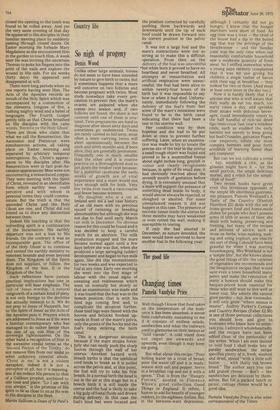The good life
Changing times
Pamela Vandyke Price
Well though I know that food takes on the temperature of the body once it has been absorbed, it never feels comfortably sustaining to me if it consists of endless salads, sandwiches and what the railways used to glamorise on their menus as "cold viands". A cold viand does not impel me onwards and upwards, even though it may keep me going.
But what about this recipe: "Pour boiling water on a crust of bread; pour the water off and it is ready; season with salt and pepper. Serve in a breakfast cup and eat it with a spoon." That is from the "Hungry Forties," quoted in Florence White's great collection Good Things in England. It refers, I hasten to add for benefit of younger readers, to the eighteen-forties. But in the between-wars depression, although I certainly did not go hungry, I knew that the hunger .marchers were short of food. An egg then was a treat — the child of the house had a dip in the boiled egg that was the privilege of the breadwinner — and the Sunday joint was the only time when our reasonably comfortable household saw a moderate quantity of fresh meat. So I sniffed somewhat when a young papa recently complained that it was no use giving his children a single rasher of bacon with their egg at breakfast — they looked for two or three. (And meat at least once more in the day too.)
Now it is hardly likely that I or anyone else who is well aware that they really do eat too much, too many times a day, and sprinkle their intake with delicious beverages, could immediately resort to the half handful of rice/six dried figs/mini-crust/last year's reindeer rinds, such as enabled the early hermits not merely to keep going but lead Crusades, galvanise Popes, cow emperors, refute the most complex heresies and pour forth scrollfuls of learning faster than any computer.
But can we not cultivate a trend — nay, establish a chic, as the glossies might have it — for the small portion, the single delicious morsel, and a relish for the simplicities of food?
Two recent books have given even this inveterate opponent of the simple life enormous gastronomic pleasure. Pamela Westland's A Taste of the Country (Hamish Hamilton £3) deals with the use of home-grown food and home-made ,dishes for people who don't possess acres of tilth or aeons of time; she deals with baking, preserving and freezing, but many of the recipes and sections of advice, such as those on herbs, wine-making, making and using yoghurt, are exactly the sort of thing I should have been grateful for when I was starting housekeeping. Mrs Westland is not a 'simple lifer', but she knows about the good things of life: the varieties of vegetables she recommends and the imaginative recipes that would save even a town household many pence and make the reputation of many a hostess should make this bargain-priced book essential for those who still wish to live well at lower cost. She admits she cannot grow parsley — but, dear namesake, it will only grow "where missus is master". Audrey Parker's Cottage and Country Recipes (Faber £2.50) is one of those personal collections you should love, and give to hostesses who know how to entertain you. I admire it wholeheartedly and the recipes have not been edited clean of the personality of the writer. When I am next limited to cold food I shall make lots of parsley sandwiches: the recipe specifies plenty of it, fresh, washed and dried, mixed '"with a little soft butter . . . with thinly cut brown bread." The author says you can add grated cheese — don't — the sandwiches are delicious by themselves. But for a packed lunch or picnic, cottage cheese would be a good idea.
Pamela Vandyke Price is also wine, correspondent of the Times


































 Previous page
Previous page